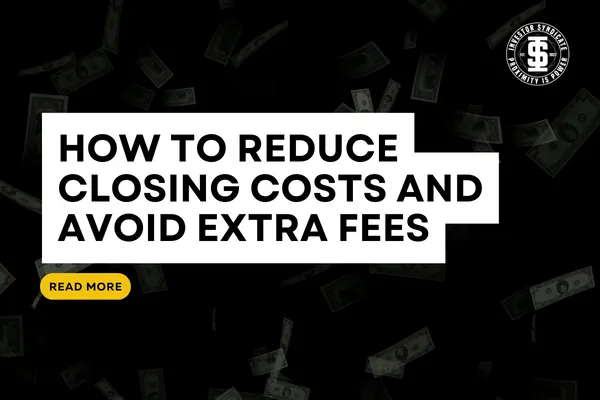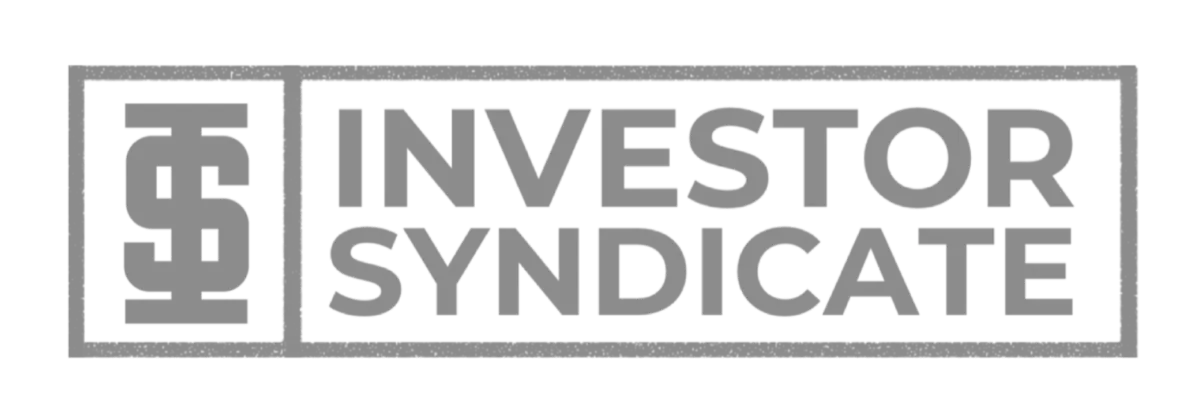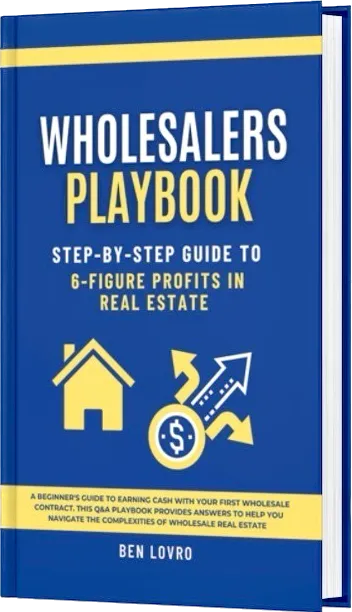Investor Syndicate Blogs
Download The Deal Flipping Playbook

How to Reduce Closing Costs and Avoid Extra Fees
Introduction
Purchasing a home is a significant financial undertaking, and part of this process involves paying closing costs. These expenses, which are additional to the price of the property, can amount to a considerable sum. However, prospective homeowners can employ strategies to mitigate these costs and circumvent unnecessary fees. This article will explore effective methods to reduce closing costs and avoid extra fees.

Understanding Closing Costs
Understanding closing costs is crucial when embarking on the journey to homeownership. These costs, which typically range from 2% to 5% of the loan amount, are additional expenses incurred when finalizing a mortgage and purchasing a home. They encompass various fees, such as loan origination, appraisal, credit reports, attorney services, and title insurance. To minimize these expenses, prospective buyers should explore strategies like shopping around for lenders, negotiating with the seller to cover some costs, and seeking no-closing-cost mortgages.
Being vigilant during the review of loan estimates and final closing disclosures can help spot errors and unnecessary fees. With careful planning and consideration, one can navigate the complexities of closing costs and make informed financial decisions in the home-buying process.
Strategies to Reduce Closing Costs
Reducing closing costs, there are several strategies to consider. First, it's essential to shop around for lenders and compare their estimates to find the most favorable terms. Negotiating with the seller can also be a valuable tactic, as they may be willing to cover a portion of the closing costs.
Another option is to explore no-closing-cost mortgages, where the lender waives these fees in exchange for a slightly higher interest rate. Scheduling your closing at the end of the month can lower prepaid interest costs. Asking for lender credits, carefully reviewing loan documents, and choosing your own service providers can further contribute to cost reduction.
Understanding title insurance and avoiding last-minute changes can help you avoid extra fees and streamline the closing process. These strategies, combined with good credit maintenance and staying within your budget, can significantly reduce the financial burden of closing costs.
Shop Around for Lenders
Interest rates and closing costs can vary considerably between lenders. Advisable to obtain quotes from multiple financial institutions and compare the Good Faith Estimates (GFEs). This comparison will enable you to choose the lender with the most favorable terms.
Negotiate with the Seller
In some cases, the seller may be willing to cover a portion of the closing costs. This is particularly common in buyers' markets, where sellers are motivated to make the sale. A real estate agent can assist in negotiations to include this concession in the purchase agreement.
Seek No-Closing-Cost Mortgages
Certain lenders offer no-closing-cost mortgages, where they agree to waive these fees in exchange for a higher interest rate on the loan. This can be advantageous if you plan to stay in the home for a short period.
Close at the End of the Month
Scheduling your closing for the end of the month can reduce the amount of prepaid daily interest you’ll have to pay. Since interest is typically charged from the date of settlement to the end of the month, reducing the number of days will lower the costs.
Ask for Lender Credits
Lender credits involve adjusting your interest rate to receive a credit toward your closing costs. This method can lower upfront costs in exchange for a higher monthly payment over the life of the loan.
Review the Loan Estimate and Final Closing Disclosure
Carefully reviewing the Loan Estimate and Final Closing Disclosure forms can help you spot errors or unnecessary fees. If you notice a fee you do not understand, ask your lender for an explanation and challenge any charges that seem incorrect.
Choose Your Services
For certain services like pest inspections or surveying, you have the right to choose which company you use. Shopping around for these services can lead to significant savings.
Understand Title Insurance
Title insurance can be one of the more substantial expenses. The two types of title insurance: lender’s and owner’s policies. While you may not be able to shop around for the lender’s policy, you can for the owner’s policy. Comparing rates from different companies can yield savings.
Avoiding Extra Fees
Purchasing a home, avoiding extra fees is crucial to keeping your budget in check. These additional expenses can quickly add and catch you off guard if you're not careful. To steer clear of unnecessary charges, it's essential to pay close attention to details throughout the home-buying process.
Avoid last-minute changes to your loan agreement, as these can lead to unexpected fees. Thoroughly review all documents and agreements to ensure nothing is overlooked, as even minor details can result in extra costs.
Stay within your pre-approved mortgage amount to prevent the temptation of homes that might incur higher closing costs. Moreover, maintaining a good credit score is vital, as lenders may charge higher fees or interest rates if your credit score drops significantly before closing. By following these steps and being diligent in your financial planning, you can navigate the home-buying journey with confidence and minimize the impact of extra fees on your budget. Here are some examples:
Avoid Last-Minute Changes
As you approach the closing date, any sudden modifications to your loan agreement can lead to additional costs that could have been easily prevented. It's paramount to ensure that all decisions and arrangements are firmly in place well before the scheduled closing. This means meticulously reviewing and confirming every detail in the documents, from the loan estimate to the final closing disclosure. Overlooking minor aspects can result in unforeseen fees, which can be burdensome.
Staying within your budget and adhering to your pre-approved mortgage amount is a prudent approach. Deviating from your financial plan might lead you to explore properties with larger loans, subsequently incurring higher closing costs.
Maintaining a good credit score is vital, as lenders may charge higher fees or interest rates if your credit score takes a significant hit between loan approval and closing. In summary, proactive planning and careful adherence to your initial arrangements can save you from the headache of last-minute changes and their associated expenses.
Do Not Overlook Minor Details
These seemingly insignificant elements can have a significant impact on the overall cost and smoothness of the home-buying experience. Minor details can hide within the paperwork, so it's essential to read every document thoroughly to ensure there are no unexpected fees or charges.
Avoiding last-minute changes to the loan agreement can help steer clear of extra expenses. Staying within your budget is another way to prevent unexpected costs, as higher-priced homes often come with higher closing costs.
Maintaining good credit is vital, as a significant drop in your credit score between loan approval and closing can lead to higher fees or interest rates. By diligently focusing on these minor details, prospective homeowners can navigate the home-buying process with confidence and financial prudence.
Stay Within Your Budget
Staying within your budget is a crucial aspect of managing your finances when buying a home. That is essential to adhere to the pre-approved mortgage amount to avoid unexpected expenses during the closing process. By staying within your budget, you can ensure that you don't fall into the trap of considering homes that may lead to higher closing costs due to a larger loan.
This prudent financial approach not only helps you maintain control over your expenses but also ensures that you can comfortably cover your closing costs and avoid any financial strain. In essence, it's a practical step to secure your financial well-being when embarking on the journey of homeownership.
Maintain Good Credit
Maintaining good credit is crucial, especially when navigating significant financial decisions like purchasing a home. Good credit not only enhances your eligibility for loans but also secures favorable interest rates, directly impacting your closing costs and overall financial health in the long run.
To preserve a robust credit score, timely payment of bills is paramount. Avoid accruing high balances on credit cards and strive to keep your credit utilization low. Regularly monitoring your credit report for inaccuracies is equally important, as errors can detrimentally affect your score. Adhering to these practices not only maintains but potentially improves your credit rating, setting a solid foundation for any future financial endeavors.
Conclusion
Closing costs are an inevitable part of buying a home, but they do not exorbitant.
By employing the strategies discussed—shopping around, negotiating with the seller, seeking no-closing-cost mortgages, closing at the end of the month, asking for lender credits, reviewing documents carefully, choosing services, understanding title insurance, avoiding last-minute changes, not overlooking minor details, staying within budget, and maintaining good credit—you can reduce these costs and avoid extra fees. Diligent research, thorough preparation, and informed decision-making will serve as your best tools in navigating the home-buying process with financial savvy.
Contact Us

Bet On Yourself
Empowering real estate investors with the tools they need to scale.






